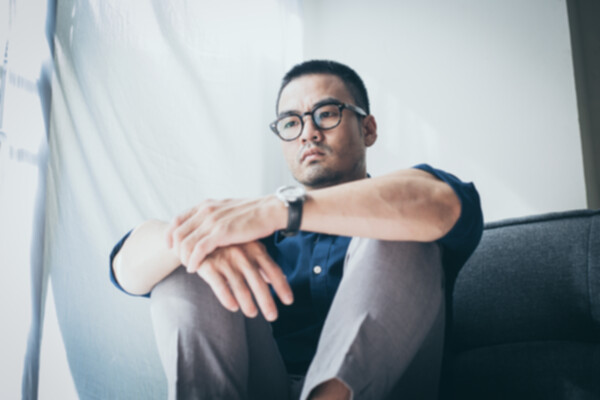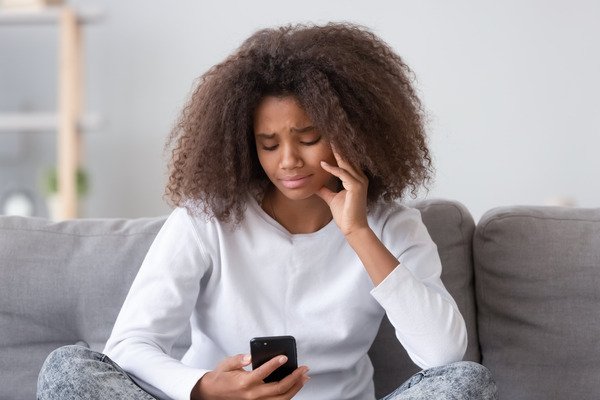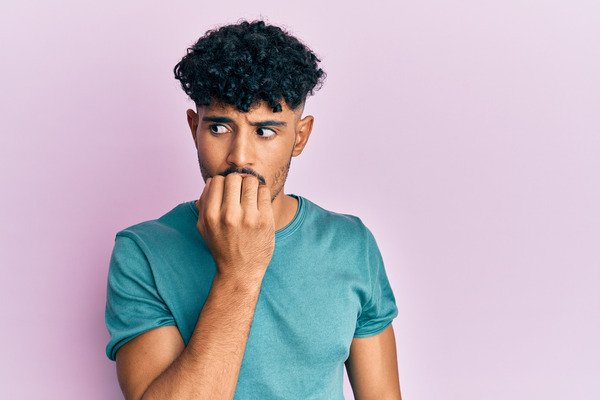Do you think you suffer from social phobia? Do you think you have social anxiety? Find the reason, the causes and the most common symptoms of this disease to be able to fight against it.

It is normal to feel fear or fear of something ; in fact, everyone can experience it. The problem is when these fears control our life, when they limit it and cause us discomfort.
The social anxiety or social phobia It is a type of anxiety that is associated with the fear of being judged by others, the fear of laughter, ridicule, comments or criticism. As we have anticipated, it is not that we remain silent during our social relationships out of shyness, but rather that we condition our social life and the interactions that we can develop based on that unfounded fear.
What is social anxiety?
We could define social anxiety as the fear of people or the fear experienced in social situations that require some interaction with other people. In this sense, it could be said that fear and anxiety come from the negative feeling of feeling judged or evaluated by others. When this problem creates behaviors or leaves consequences in a person’s life, we could say that we are facing a social anxiety disorder
Because of this problem, people who suffer from social phobia often end up being seen by others as shy and withdrawn, as well as nervous or disinterested. Therefore, the social phobia or social anxiety It ends up being a problem that affects people in different areas of life.
Many times people who suffer from this anxiety disorder really want to be included in groups and participate in certain social activities. So much so, that they end up suffering both from not attending these meetings and from not being able to enjoy it when they do go to them because of their phobia of people
Social Anxiety Test
Find out if you suffer from one of these social disorders through this test to know if you have social anxiety:
Types of social phobia
There are different types of social phobia or social fear What people who suffer from it can suffer from.
- Specific social phobia: When you suffer from this social phobia, people are able to mix socially with people in most situations. The problem arises on some occasions where anxiety arises in certain social environments. For example, when speaking in front of a large group of people. In these cases, the person who suffers from this social anxiety feels examined and judged negatively by everyone else.
- General social phobia: Through this specific phobia, people who suffer from it become anxious when they are around other people. In this way, they can feel constantly watched and judged. So much so, that suffering this type of imaginary ‘attacks’ causes the person to end up avoiding many of the social situations in their life. When we suffer at this level we can say that we are facing a social anxiety disorder
Social anxiety disorder
Social anxiety disorder is an anxiety disorder that causes extreme fear in social settings. When someone suffers from this social phobia disorder, it involves having these feelings of fear of people on a recurring basis. Although most people feel that their fears may be irrational, in these cases they feel helpless or without the strength to overcome them.
Social anxiety: Symptoms
There are a series of symptoms that are typical of anxiety and that, in the case of social anxiety, manifest when the person who suffers from it interacts with others within a social relationship, or simply interacts with someone (the bank teller, the teacher at their child’s school, the supermarket saleswoman…). members of his own family.
When this happens, that person suffers a series of symptoms that make them develop avoidance strategies to avoid feeling the discomfort associated with these. social phobias These manifestations can reach both a physical and psychological level.
- Physical signs: These signs appear in the body of the person who suffers from social anxiety Sometimes they even end up causing some embarrassment and further encourage the onset of anxiety. Most people with social phobia usually experience chills, sweaty hands, stomach discomfort, palpitations, stuttering and even a feeling of suffocation due to these social disorders.
- Negative thoughts: Thinking excessively about past situations or dwelling on the same negative thoughts ends up being very negative for those who suffer from this. social fear
- Abuse alcohol or drugs: By continually suffering from these intrusive thoughts due to symptoms of social phobia, many patients end up succumbing to alcohol in order to stop thinking like this. This ends up generating an almost abusive relationship with these substances.
- Negative beliefs: People who suffer from these social disorders often have beliefs about their inadequacy in social situations. These types of thoughts can be related to feeling observed or feeling humiliated in front of others, despite the fact that there is no evidence that indicates these types of attitudes.
- Negative bias: Someone with these social phobias may think that they have never had good positive experiences with others as well as magnify the social skills of those around them.
- Avoidance behaviors: In order to reduce these types of social fear, many people end up avoiding social situations or things that are related to it.
- Unsafety: People who suffer from a social anxiety disorder feel very insecure in situations that involve establishing a bond with others.
By constantly trying to avoid certain social situations, you end up harming the social environment of the person with social phobia Affecting anxiety and your mental health even more.

Social phobia: Main causes
The causes of social phobia can be found in:
1. Biological variables:
- Genetic predisposition
- Neuroticism/Introversion
- Physical image
- Lack of social skills skills
2. Environmental variables due to a negative social context
- Family context: Family models of withdrawal or excessive socialization
- Deficient social stimulation (social isolation)
- Psychopathological disorders of parents
- Family fights or arguments
- Incorrect messages from children about being shy
- Abuse and mistreatment
3. School context and social relationships:
- Inappropriate behavior of teachers (comparisons, humiliations, etc.)
- Harassment at school by classmates (bullying or moving)
4. Other causes:
- Constant changes of residence
- Hospitalization
Each of these traumatic experiences can make the idea of socializing related to a negative emotion This is how, over the years, they can lead to social anxiety.
How do I know if I have social anxiety?
Yes, when I interact with other people in a meeting, at work or with family; Yes, when I interact with others when carrying out a transaction, buying something or making a complaint; If I stutter or sweat when I talk on the phone, we may have a social anxiety problem
There are a series of thinking errors that characterize all those people who suffer from anxiety:
- Fear of being judged: Fear that others they are judging for everything they do or say.
- Criticism phobia: Feeling terrible fear of receive criticism or laugh at something you say or do.
- Think of the worst: Imagine catastrophic situations that make the symptoms even worse.
- Be very critical of yourself: Be self-critical (He’ll think I’m stupid, when I leave he’ll tell the others how I talk, I’m sure he’ll comment that this sweater looks really bad on me…).
- Think about what you should do: Refer to the dreaded “shoulds”: I should have said this; I should have sat there, I should have worn something else, I should have acted that way.
- Escape from certain situations: Avoid all those situations that cause fear and discomfort (talking to others, leaving the house, talking on the phone, etc.).

Social phobia and depression
The teasocial anxiety disorder It can have many consequences for the personal and professional lives of those who suffer from it. In fact, these social disorders can lead to the following effects:
- Low self-esteem: The social phobia It can end up damaging our self-esteem. The reason for this is that this social disorder causes feelings of worthlessness and negativity towards those who suffer from it.
- Negative thoughts: These types of social fear They trigger many negative thoughts that can interfere in the life of the person who suffers from them.
- Sensitivity to criticism: People who suffer from symptoms of this social phobia They tend to end up being very sensitive to the constructive criticism that may come from those around them.
- Lack of social skills: By getting carried away by this social fear people can end up limiting their relationships with others, something that can also result in not learning new social skills to deal with this social disorder.
- Depression: Depression is another consequence of not treating a social anxiety disorder People are sociable beings and we need relationships with others to enjoy good mental health.
Social phobia: What is the most effective treatment?
If we believe that we suffer social anxiety, we must go to the psychologist’s office to evaluate our case and determine the appropriate diagnosis. This professional will examine our symptoms and try to find out what causes them and if there is also another emotional problem related to anxiety that needs to be treated.
Depending on the situation we present, we will be offered one type of therapy or another. Normally, the one that offers the best results is cognitive behavioral therapy, but the psychologist may consider another type of approach if our case requires it.
There are times when therapy alone is not enough. In this way, if the discomfort has worsened greatly our problem To the point that it limits our lives in a significant way, the professional may advise that we contact a psychiatrist to prescribe pharmacological treatment in order to alleviate the symptoms and enhance the benefits of the therapy.

How to overcome social anxiety?
As we see a social anxiety disorder It can affect many areas of those who suffer from it. For this reason, in addition to going to a specialist in social phobias, you can also follow the following advice:
- Get out of your comfort zone: A good way to deal with phobia of people It is to try in a moderate way to go to the places that normally cause these types of social fear. Trying it gradually or accompanied by someone you trust will help you overcome this social disorder.
- Improve your health: Doing more physical exercise as well as changing to a healthier diet can help you improve your feelings of social anxiety and the symptoms associated with this disorder.
- Set goals: In order to face the phobia of people It is important to try to take on small goals to start taking steps towards a better social life. To improve your results, writing down your goals can help you have more motivation to do what you want.
- Start saying ‘yes’: It is normal for people who suffer from social phobia They are used to saying ‘no’ to everything. Therefore, a good way to overcome social anxiety is to start committing to social events. The next time someone invites you to something, say yes.
- Pay attention to your thoughts: Sometimes we don’t realize that it is our negative thoughts that take control of our lives.








